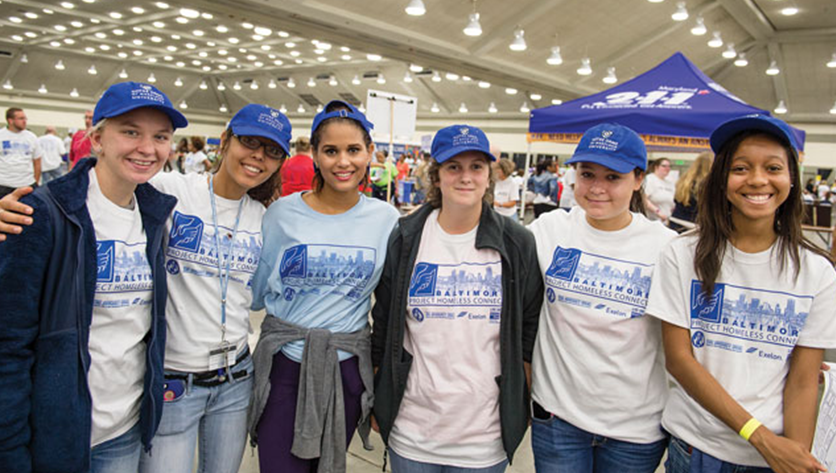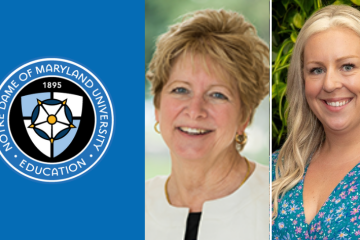A Greater Purpose

On a warm morning in early October, more than 200 students, faculty, and staff descended on the Baltimore Convention Center to volunteer at the United Way’s third annual Project Homeless Connect, an event that connects the homeless and those at risk for becoming homeless with essential services and information. The Notre Dame contingent was easy to spot among the 2,300 volunteers, as they were decked out in blue Notre Dame of Maryland baseball caps.
Of all the local college and university volunteer groups, Notre Dame’s was the largest by far—for the second year in a row. President Marylou Yam was invited to speak, along with Mayor Stephanie Rawlings-Blake and United Way President and CEO Mark Furst. “Today will be an important and powerful experience for all of you,” Dr. Yam said. “This is a great way to put the idea of serving others into action.”
Service is in the DNA of this institution—it’s what drew the brave School Sisters of Notre Dame across the ocean to America from Bavaria, to continue their work educating poor German girls and young women in a new setting. Vice President for Mission Eileen O’Dea, SSND ’66, notes that Notre Dame’s core values are inextricably linked to those of the School Sisters—intellectual and professional excellence, service to others, and social responsibility—“not because the SSNDs imposed those values on the institution, but because we share those ideas with other people and they say, ‘Yes, we want to do that, too.’”
Notre Dame students engage in service from their first weeks at the University. Many of the volunteers at Project Homeless Connect were first-year students, participating through NDMU-100, the first-year seminar. Students take part in reflection activities before and afterward, comparing stereotypes and myths about homelessness with factual information. “Students always talk about the bubble of Notre Dame, and this forces them out of that bubble right away their first year. But it’s in a safe environment,” says Melissa Lees, director of Mission & ministry and service. “There are a lot of negative stereotypes about Baltimore and about homelessness, and this opportunity breaks both of those.”
First-year student Allyson Whitacre says she learned a lot about the struggles of the homeless to access basic health care and services—and about her obligation to help. “Responsibility is key at Notre Dame, because we always talk about being independent, being leaders—and being here, we’re basically the leaders to these people that need our help,” she says. “We need to be able to take charge and help them get what they need.” For her, it was a fitting way to begin her time at Notre Dame. “It’s mostly about, over the next four years, becoming better women—better people overall.”
The Principle of Transformation
The SSNDs’ goal at Notre Dame has never been less than transformation—the tagline “transforming the world through education” still rings true. According to Sr. Eileen, like all religious congregations, the SSNDs’ goal was to address unmet needs—and she traces that goal throughout Notre Dame’s history. In addition to the Women’s College, it can be seen in the establishment of the Weekend College in 1975 to serve working women and men (now known as the College of Adult Undergraduate Studies) and the Graduate Studiesprogram in 1984 to provide opportunities for further advanced education. In more recent years, it can be found in the establishment of the Ph.D. in Instructional Leadership for Changing Populations in 2004 and the Schools of Arts and Sciences, Education, Nursing, and Pharmacy—all of which are distinguished by a profound commitment to service and community-building.
The proof is in the numbers: During the 2013-2014 academic year, the Notre Dame community completed an impressive 104,612 hours of service and service-learning, the equivalent of $2.3 million. Nearly half of all enrolled students participated in service at least once. Many participated numerous times—through clinical experiences in the School of Nursing, student teaching in the School of Education, the AdvoCaring program in the School of Pharmacy, and various volunteer and service-learning opportunities in the School of Arts, Sciences, and Business. Even members of the Renaissance Institute for lifelong learning and the youngsters in A Child’s Place nursery school and kindergarten pitched in. “It’s a very engaged campus,” says Lees, who in early December received the news that Notre Dame was selected for the President’s Higher Education Community Service Honor Roll.
Lees has long felt a calling to service. A religious studies major at Marywood University, she volunteered all four years with women inmates at the Lackawanna County prison, helping the inmates record books on tape to be sent home to their children. After college, Lees completed a year in AmeriCorps, an intensive community service experience that’s known as the domestic version of the Peace Corps; she later served as site director of Notre Dame Mission Volunteers AmeriCorps. Lees then went on to earn an M.A. in pastoral ministry at University of Dayton, where, as a graduate assistant in Mission & Ministry’s Center for Social Concern, she realized the inextricable link between service and faith. “As a Catholic, it’s part of who I am,” she says.
At Notre Dame, Lees has been director of mission & ministry and service since 2009. She’s overseen service-learning since January 2013; since then, there has been a significant increase in the number of students participating in civic engagement initiatives. In fall 2013, first-year students at Notre Dame completed 1,023 service hours and 29 service projects at 12 service sites—including My Sister’s Place, Beans & Bread, and Our Daily Bread, where students work on a regular basis. Her achievements were publicly recognized this fall, when Lees received the Governor’s Service Award in the Service-Learning Leader category and was named a Leading Woman by the Maryland Daily Record.
In August, Lees was busy planning the new Bonner Leaders program, her big project in the Women’s College this year in collaboration with Dr. Rebecca Sawyer, vice president for student life. Funded by the Bonner Foundation, the program pairs students with community organizations to provide the kind of long-term, intensive service that the foundation believes is critical to effecting real change. The students commit to providing 300 hours of service each year, all four years of college, at the same site. In exchange, they receive work-study funds and free campus housing; they also attend special Bonner conferences and meetings, as well as weekly workshops at NDMU on leadership, social issues, personal growth, and related topics. Notre Dame is the first school in Maryland to offer this program.
The Bonners, as Lees calls them, will be a small group—just five students from each class. This year, the program is launching with five first-years and five sophomores. Micah Castelo, Class of 2018, assists with programming and serves meals to the residents of the Weinberg Housing and Resource Center, a Catholic Charities homeless shelter. “I really like how Notre Dame focuses a lot on giving back to the community. I don’t think that service is really required or endorsed in my friends’ colleges as greatly as here at Notre Dame,” she says.
Other Women’s College students are finding ways to collaborate on service projects as well. Omega Phi Alpha, the Women’s College service sorority, has a full lineup of activities in the works, from collecting soda tabs for Ronald McDonald House to selling crafts to benefit economically depressed people in the Philippines as part of Threads of Hope. And a group of students, inspired by their experience on a United Way alternative spring break trip to Washington, D.C., last year, have just launched a campus United Way group. “We formed Student United Way primarily to provide service opportunities to the students at NDMU focusing on the Baltimore community—dealing with education, financial stability, and health,” says President Sarishma Thapa, Class of 2017. “Our community needs volunteers, especially young students like us. I believe that when students come together, they have the power to change the world and make a difference.”
According to Sr. Eileen, it’s that belief that motivated Blessed Mary Theresa of Jesus Gerhardinger, the foundress of the SSNDs. “[There was] always the idea that we enrich people with an education, and always the idea that they will share their gifts with other people. We see that in the many service projects here, the many ways we encourage faculty and staff and students to become involved in outreach programs. That is very consistent with our history.”
Preparation for Real Life
All four Schools offer service-learning courses, which connect what students learn in the classroom to reality. Through this experience, students are compelled to ask why certain conditions—homelessness, disenfranchisement, poverty, and more—exist and what they can do to ameliorate them. “It’s preparation for real life, and really that is the desired outcome of Catholic social teaching,” says Debra Franklin, Ph.D. ’76, dean of the School of Arts, Sciences, and Business. “Once you are exposed to great ideas and ways of thinking and ways of engaging the world, that leads you to a call to action. That is the ultimate goal: call to action and future leadership.”
The longest continuously running service-learning course in the School (and perhaps the institution) is Introduction to Women’s Studies, offered every year in the spring. Under the direction of associate professor of history Susan Barber, Ph.D. ’84, students learn about violence against women and women’s experiences in prison—and then work with inmates at the Maryland Correctional Institute for Women to create T-shirts for the Clothesline Project, which bears witness to experiences of domestic violence. Students help hang the shirts on Doyle Lawn and organize events relating to domestic violence awareness. “This kind of project fits perfectly with our mission and with the SSND ministry—to improve the lot of women and girls that are in some kind of distress,” Dr. Barber says. “The students learn great compassion through this experience. They learn to let go of stereotypes, so that they’re not afraid because they know that someone has been in a prison.”
In the School of Nursing, among the various service and service-learning opportunities for students is a project helmed by faculty member Sabita Persaud, Ph.D., R.N. For the second year, she is directing a service-learning partnership with Wolfe Street Academy and the Baltimore Curriculum Project. In spring 2013, she arranged for 15 Notre Dame nursing students to tutor 33 Wolfe Street Academy students once a week. Students will continue that work again this academic year as part of a course called Nursing Research. “Service on behalf of vulnerable populations is at the heart of Notre Dame, the School of Nursing, and the nursing profession. Our faculty, staff, and students take that commitment seriously,” says Katherine Cook, Ph.D., R.N., dean of the School of Nursing.
In the School of Education, faculty members conduct in-service presentations at Baltimore County and Baltimore City schools on topics requested by the faculty—strictly on a volunteer basis. And through ACES—Academy of Catholic Educators—Gail Donahue, Ph.D. ’12, provides professional development to staff in area Catholic schools on such topics as technology integration, math instruction, and assessment. (To read more about ACES, see NDMU News on page 18.)
And of course there’s the well-regarded Operation TEACH, now in its 14th year. The popular two-year program enables aspiring educators to earn an M.A. in Teaching degree at Notre Dame while teaching in Catholic schools and living in community. “It’s true they get a degree from us,” says Dean Sharon Slear, SSND ’66, “but it’s a service. They offer a lot of service to the schools.”
The School of Pharmacy is in the fifth year of its innovative AdvoCaring program, which gets student pharmacists out into the community to work with partner nonprofit agencies to determine their health care needs. In this program, student pharmacists conduct health fairs, blood pressure screenings, medication take-backs, flu clinics, and more. This year’s sites include Gilchrist Hospice Care, Greenmount Senior Center, and Arc of Baltimore—which over the summer awarded the School its 2014 Intern Service Award to recognize four years of service.
Beyond AdvoCaring, students are required to complete three hours of direct patient care service every semester—and many, says Dean Anne Lin, Pharm.D., do more. “All of our student organizations, particularly our [Academy of Student Pharmacists] chapter, do a lot of activities. Students go way beyond the requirement that we have,” she says. All told, before the start of the fall 2014 semester, the School of Pharmacy could boast of 14,813 service hours since 2009.
An International Perspective
Undergraduate students interested in education and international service can take IDS-310, Service Abroad: Women in Leadership and Service, a four-credit course that developed out of a partnership between the SSNDs at Notre Dame and those in Latin America and Africa. Students learn about the politics, culture, and history of their destination country—in recent years, it’s been Brazil or Peru—and then spend up to six weeks volunteering in the country. Many participants have found it life-changing. “I learned so much,” says Julie Carter, who spent time in Brazil in 2013; she will graduate from the BA/MAT program this spring. “I came to love the culture and the people I worked with, who went out of their way to work with me and to help me in both understanding the culture and the educational system that is so different from the American one I’ve grown so used to.”
International students at Notre Dame are involved in service, too. One such opportunity is the English in Action course, created by Mary Burch “MB” Harmon ’93, special programs coordinator in the English Language Institute. Students learn about social issues like homelessness and poverty, and then put that knowledge—and their English skills—into practice through volunteering at a variety of organizations, from Habitat for Humanity to the Maryland Food Bank. “Experiential learning is very important. I find it changes them so much,” Harmon says. “Sometimes we just need to provide the door for students to go through to understand how they can be a part of something, because sometimes they don’t know how to get there or what to do. I really believe that that’s part of my job and part of what I’m about.”
Service-learning is the perfect expression of what Notre Dame is all about, says President Marylou Yam, Ph.D. “Notre Dame’s integration of academics and service shows our students that the two go hand-in-hand. Here, students experience the transformative power of education in their own lives, and then go on to impact the lives of others. That’s Notre Dame’s mission in action.”
Notre Dame alums continue to live out their commitment to service after graduation. There’s Antoinella Peterkin ’12, who completed the AmeriCorps Public Allies national service program and is now developing a program to connect Baltimore students with entrepreneurs in art and fashion. There’s Chris Sachse ’11, M’12, the principal and co-founder of the IT services firm Horsetail Tech; he mentors young people in the Year Up program and serves as vice president of the board of Maryland CASA. And there are Andrea Bowden, Ph.D. ’69, and Betty Contino ’89, who received Notre Dame’s Service to Society Award at Reunion 2014 for their contributions to the Baltimore community. Thousands of other graduates have committed their professional and personal lives to serving others over the course of Notre Dame’s history.
Space doesn’t allow for comprehensive coverage of the many service-oriented courses, activities, and initiatives taking place on and off Notre Dame’s campus. However, even this small sampling demonstrates that Notre Dame of Maryland University’s orientation toward service still resonates today as it did at the institution’s start. “As we begin our 120th year, we can see the pattern of continuity and change over the years. We have been true to our traditions and true to the principle of transformation,” says Sr. Eileen. “The vision and values of the SSNDs are alive and well in this institution on North Charles Street.”




